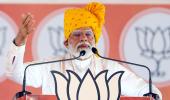The first time the Election Commission has taken cognisance of a model code of conduct complaint against a sitting prime minister.

The Election Commission issued a notice to Bharatiya Janata Party President J P Nadda on Thursday, April 25, 2024, on a complaint lodged by the Opposition parties alleging that Prime Minister Narendra D Modi had violated the model code of conduct during his speech in Rajasthan's Banswara on Sunday, April 21, 2024.
This is the first time the Election Commission, according to its officials, has taken cognisance of a model code of conduct complaint against a sitting prime minister.
The poll body has asked Nadda to respond by Monday to the complaints filed by several parties, including the Congress and Left parties, as well as civil society groups.
These groups have flagged the prime minister's speech as 'divisive and derogatory'.
The Election Commission also issued a notice to Congress President Mallikarjun Kharge, asking him to respond to complaints filed by the BJP against him and party leader Rahul Gandhi.
These complaints concern remarks made by them in their respective election speeches in recent days.
Following these developments, the Congress claimed that the EC is "super, super cautious" when it comes to complaints against the prime minister.
Its leader Jairam Ramesh pointed out that the notice has been given to the BJP president, not the prime minister.
"There had been no complaint against (then prime ministers) P V Narasimha Rao, Atal Bihari Vajpayee and Manmohan Singh. This is the second time we have complained against the PM. We had earlier complained about the home minister (Amit A Shah) but no action was taken; action was taken against the Assam chief minister," Ramesh pointed out.
In the 2019 Lok Sabha polls, the Election Commission had given a clean chit to Modi on complaints lodged by Opposition parties.
Then election commissioner Ashok Lavasa gave a dissent note on some of the decisions taken by the Election Commission on complaints against Modi.
As for the current notices, Election Commission officials told PTI that while individual star campaigners would continue to remain responsible for speeches made by them, the commission will address party chiefs 'on a case-to-case basis'.
With this, the Election Commission has ensured an 'added layer' of responsibility on party heads, they said.
In its letter addressed to Nadda, the Election Commission asked him to respond by Monday to complaints filed by the Congress, CPI and CPI-ML regarding the 'divisive and derogatory' remarks made by Modi on April 21 in Banswara.
It also asked Nadda to bring to the notice of all 'star campaigners' of the party to 'set high standards of political discourse and observe provisions of the model code of conduct in letter and spirit'.
The Election Commission has invoked provisions of the Representation of the People Act to hold party presidents as the first step to rein in star campaigners.
The poll body sent a similarly worded notice to Kharge to explain the allegations that the BJP has levelled on his and Gandhi's speeches.
The letters from the Election Commission to the two party presidents did not directly name either Modi, Gandhi, or Kharge, but the representations received by it were attached to the respective letters and they contained details of allegations against the three leaders.
In its complaints to the Election Commission, the BJP said that in Coimbatore in Tamil Nadu, Gandhi alleged that the prime minister was attacking 'our language, history, and tradition'.
The ruling party also accused Kharge of violating the model code by claiming that he was not invited to the Ram temple consecration ceremony due to discrimination against SCs and STs.
In their complaints, the Congress, the Left parties, and civil society groups referred to Modi's Banswara speech where he alleged that the Congress intended to redistribute the wealth of the people to Muslims and that the opposition party won't even spare the 'mangalsutra' of women.
The Election Commission said that campaign speeches made by those holding high positions have more serious consequences.
Feature Presentation: Ashish Narsale/Rediff.com











